
INTERNATIONAL REVIEW OF THE AESTHETICS AND SOCIOLOGY OF MUSIC
Scope & Guideline
Transforming Perspectives on Music and Its Social Fabric
Introduction
Aims and Scopes
- Aesthetic Analysis of Music:
The journal explores various aesthetic theories and how they relate to musical works, examining concepts such as beauty, emotion, and expression in both classical and contemporary contexts. - Sociocultural Impacts of Music:
Research published in the journal investigates how music interacts with social structures, cultural identities, and historical narratives, reflecting on its role in societal change and individual agency. - Interdisciplinary Approaches:
The journal encourages interdisciplinary methodologies, incorporating perspectives from sociology, philosophy, ethnomusicology, and performance studies to enrich the understanding of music's multifaceted nature. - Focus on Global and Local Music Practices:
The journal provides insights into both global music trends and local musical practices, emphasizing the importance of context in the understanding of musical phenomena. - Exploration of Music Technology and Digital Culture:
Recent papers delve into the impact of digital technologies on music creation, distribution, and consumption, reflecting the evolving landscape of music in the digital age.
Trending and Emerging
- Intercultural and Global Music Practices:
There is an increasing focus on intercultural exchanges in music, as evidenced by studies on traditional music forms and their adaptations in modern contexts, highlighting the fluidity and hybridity of musical identities. - Music and Technology:
Recent research emphasizes the role of digital technologies in reshaping musical creation and consumption, exploring genres like Mahraganat and their evolution in the digital landscape. - Agency and Identity in Music:
Emerging themes around agency, particularly relating to gender and identity within musical contexts, are gaining traction, reflecting a broader societal discourse on representation and power dynamics in music. - Music as a Tool for Social Change:
There is a growing trend of examining music's role in social movements and cultural shifts, focusing on how music can reflect and influence societal transformations. - Embodiment and Performance Studies:
Recent publications are increasingly concerned with the embodied experience of music, examining how physicality and performance influence musical interpretation and reception.
Declining or Waning
- Traditional Musicology:
There has been a noticeable decline in topics strictly focused on traditional musicology, such as historical music analysis or biographical studies of composers, as the journal increasingly embraces interdisciplinary and contemporary approaches. - Eurocentric Perspectives:
Papers focusing predominantly on Western classical music and its historical development are less frequent, indicating a waning interest in Eurocentric views of music in favor of more diverse, inclusive perspectives. - Static Theoretical Frameworks:
The application of static theoretical frameworks in analyzing music is diminishing, as researchers seek more dynamic and context-sensitive methodologies that account for the complexities of modern musical experiences.
Similar Journals
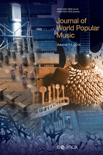
Journal of World Popular Music
Unveiling Diverse Voices in Popular Music StudiesJournal of World Popular Music, published by EQUINOX PUBLISHING LTD, serves as a pivotal platform for scholars and practitioners within the evolving field of popular music studies. With an ISSN of 2052-4900, this esteemed journal has notably positioned itself within the Q2 category of Music as of 2023 and ranks at #90 out of 180 in the Arts and Humanities sector according to Scopus metrics. Spanning research from 2014 to 2023, the journal invites contributions that span diverse musical genres, cultural studies, and global perspectives, ultimately enriching the discourse surrounding the sociocultural impact of popular music. While not open access, the journal offers a robust platform for interdisciplinary research, making it indispensable for researchers, educators, and students keen on exploring the dynamics of popular music and its role in contemporary societies.
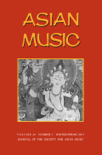
ASIAN MUSIC
Celebrating the Rich Tapestry of Asian Musical Traditions.ASIAN MUSIC is a distinguished academic journal published by University of Texas Press, focusing on the rich and diverse musical traditions of Asia. With an ISSN of 0044-9202 and an E-ISSN of 1553-5630, this journal serves as a key platform for interdisciplinary research that encompasses musicology, ethnomusicology, and cultural studies related to Asian music practices. While ASIAN MUSIC is not an open-access journal, it provides valuable insights and scholarly articles that contribute significantly to the understanding of music’s role within Asian cultures. The journal originally covered works from 2002 to 2010 and has a reputation for fostering discussions that celebrate the intricacies of sound, performance, and society. Targeting researchers, professionals, and students alike, ASIAN MUSIC stands as a crucial resource for those engaged in the study of music in its multifaceted context.

World of Music-New Series
Illuminating the cultural tapestry of music through rigorous discourse.World of Music-New Series, an esteemed journal published by VWB-VERLAG WISSENSCHAFT & BILDUNG, serves as a pivotal platform for scholarly discourse in the field of music studies. With an ISSN of 0043-8774 and a significant presence in the academic community, this journal has demonstrated its commitment to advancing knowledge in music through rigorous peer-reviewed research. Since its inception in 2002, the journal has undergone several converged years, culminating in its current iteration which continues to publish innovative work as of 2023. Recognized for its contributions, World of Music-New Series holds a Q3 category ranking in the Music category and is positioned within the 52nd percentile among its peers, reflecting its growing impact in the arts and humanities domain. Although currently not an open access journal, it remains an essential resource for researchers, professionals, and students seeking to deepen their understanding of music theory, history, and cultural implications. Located in Germany at URBANSTRASSE 71, D-10967 BERLIN, this journal is committed to promoting diverse voices and perspectives within the music scholarship landscape.
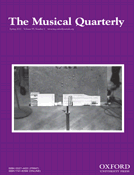
MUSICAL QUARTERLY
Championing High-Quality Music Research Since 1915MUSICAL QUARTERLY, published by Oxford University Press Inc, is a distinguished journal in the field of music, with a publication history that stretches back to 1915. This esteemed journal, identifiable by its ISSN 0027-4631 and E-ISSN 1741-8399, provides a critical platform for scholarly discourse, analysis, and research in musicology and related disciplines, facilitating an understanding of both historical and contemporary musical practices. Although it operates without open access, it continues to attract a diverse readership of researchers, educators, and students alike, thanks to its well-curated articles and reviews that engage with music theory, history, and ethnomusicology. With a current Scopus rank of #119 out of 180 in the Arts and Humanities category and a 34th percentile ranking in Music, MUSICAL QUARTERLY plays a vital role in advancing knowledge and fostering collaboration within the music academic community. Its commitment to high-quality scholarship is reflected in its ongoing efforts to address the evolving landscape of music studies, making it an essential resource for anyone serious about exploring the rich tapestry of music scholarship.
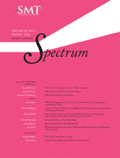
MUSIC THEORY SPECTRUM
Unveiling the Spectrum of Musical UnderstandingMUSIC THEORY SPECTRUM, published by Oxford University Press, serves as a premier journal in the field of music theory, recognized for its significant contributions and scholarship since its inception. With an ISSN of 0195-6167 and E-ISSN 1533-8339, this journal has established a distinguished position within the academic community, boasting an impressive Q1 status in the Music category for 2023 and ranking #17 out of 180 in Scopus for Arts and Humanities, Music, placing it within the 90th percentile. Despite its non-open access format, MUSIC THEORY SPECTRUM offers a wealth of research articles, reviews, and theoretical discussions aimed at both seasoned scholars and students alike. It spans from 1981 until present, fostering critical engagement and advancing understanding within the discipline. Researchers and music theorists will find this journal an invaluable resource for the latest insights and methodologies in music theory.
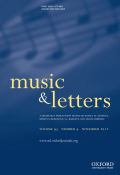
MUSIC & LETTERS
Decoding the Symphony of Literature and MusicMUSIC & LETTERS, published by Oxford University Press, is a prominent academic journal that has been at the forefront of musicology and music studies since its inception in 1920. With an ISSN of 0027-4224 and an E-ISSN of 1477-4631, the journal provides a platform for scholarly articles that explore the rich interplay between music and literature, contributing significantly to the understanding of musical context, form, and societal impact. As of 2023, it holds a respectable Q3 rank in Music within its category, positioned at Rank #66 out of 180 in the Scopus Arts and Humanities Music category. Despite not being an Open Access journal, its rigorous peer-review process and commitment to high-quality research make it an essential resource for researchers, professionals, and students alike. The journal's scope encompasses various genres and historical periods, ensuring a comprehensive examination of music's role in culture and community, thereby enhancing the scholarly discourse within this vibrant field. Based in the United Kingdom, at Great Clarendon St, Oxford OX2 6DP, England, MUSIC & LETTERS continues to inspire and inform the global music scholarly community.

Muzikoloski Zbornik
Innovating the Study of Music Across CulturesMuzikoloski Zbornik is a prominent open-access journal in the field of musicology, published by the esteemed University of Ljubljana Press since 1965. Hailing from Slovenia, this journal has been dedicated to advancing the study of musical heritage, theory, and practice, serving as a vital platform for researchers, professionals, and students alike. With a notable Q2 category ranking in the field of music and a Scopus ranking of 109 out of 180 in Arts and Humanities, Muzikoloski Zbornik showcases high-quality research, fostering discourse and collaboration among scholars globally. The journal embraces a diverse range of topics, from ethnomusicology to music education, ensuring its relevance in an ever-evolving academic landscape. By providing unrestricted access to its content, it champions the dissemination of knowledge and supports the growth of the musicology discipline.

FONTES ARTIS MUSICAE
Illuminating the art of music through scholarly insights.FONTES ARTIS MUSICAE, with ISSN 0015-6191 and E-ISSN 2471-156X, is a distinguished journal published by A-R EDITIONS, specializing in the fields of Music and Library and Information Sciences. Established in the United States, this journal serves as a vital resource for scholars, practitioners, and students engaged in the exploration and analysis of music and its associated disciplines. With an established converged publication history from 2002 to 2024, FONTES ARTIS MUSICAE has consistently contributed to the discourse within its scope, reflected in its current quartile rankings of Q4 in Library and Information Sciences and Q3 in Music for 2023. Although not an open-access journal, it offers essential insights and research findings, appealing to a diverse academic audience. Its position within the 18th percentile of the Arts and Humanities (Music) category and 11th percentile in Library and Information Sciences underscores its growing significance in these fields, making it a critical platform for advancing knowledge and fostering collaboration.
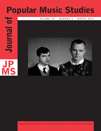
Journal of Popular Music Studies
Charting the Cultural Currents of Popular MusicJournal of Popular Music Studies, published by University of California Press, is a preeminent academic journal dedicated to the exploration and analysis of popular music and its cultural implications. With an ISSN of 1524-2226 and an E-ISSN of 1533-1598, this journal encompasses a range of methodologies, encouraging interdisciplinary dialogue across fields such as musicology, cultural studies, and sociology. Since its inception in 1988, it has provided a platform for critical examination of popular music through various lenses, contributing significantly to the understanding of music in contemporary society. The journal maintains a robust reputation, currently holding a Q2 ranking in the Music category of Scopus, positioning itself within the 58th percentile among its peers. As an invaluable resource for researchers, professionals, and students alike, the Journal of Popular Music Studies remains committed to fostering innovative scholarship and discussions that illuminate the impact of popular music on social and cultural landscapes.

Opus
Unveiling the Dimensions of Musical DiscourseOpus is an esteemed open-access journal published by the Associação Nacional de Pesquisa e Pós-Graduação em Música in Brazil, focusing on the field of music studies. With an ISSN of 1517-7017, Opus has been dedicated to fostering innovative research since its inception and has embraced the open-access model since 2009, ensuring that its findings are readily accessible to scholars and enthusiasts globally. The journal has achieved a commendable Q2 ranking in Music as of 2023, showcasing its impact and relevance within the arts and humanities. Although currently ranked #130 out of 180 in Scopus in the music category, Opus maintains a commitment to enhancing the scholarly discourse in musicology through empirical studies, theoretical analyses, and interdisciplinary approaches. The journal's convergence over the years, from 2017 to 2024, reflects its dedication to evolving educational and research methodologies in music. Situated in the vibrant academic landscape of Campinas, SP, Brazil, Opus invites researchers, professionals, and students to contribute to its mission of exploring the multifaceted dimensions of music.